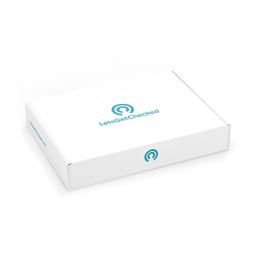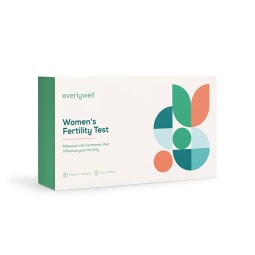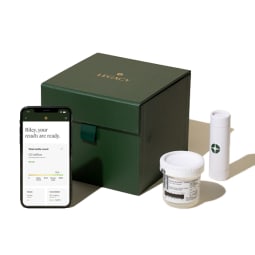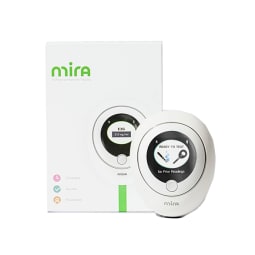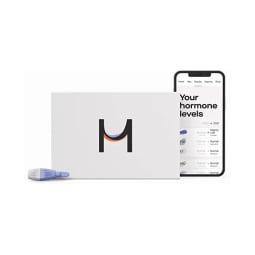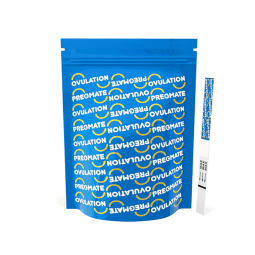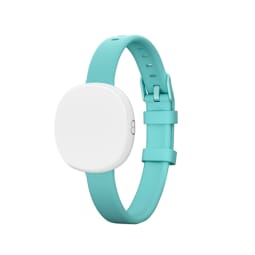Advertisement
The 7 Best At-Home Fertility Tests & How To Pick The Right One For You


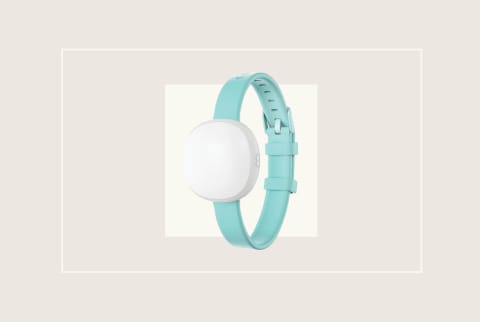
Whether you're actively trying to get pregnant or are just starting to think about your fertility, these days you can learn more about your hormone levels without ever leaving your home. At-home testing kits are an easy way to check in on some of the metrics that affect your fertility, and they're often less expensive than what you might pay at a fertility clinic.
Fertility can be a journey, and learning about your hormone levels will better inform the next step in that process. To help get a handle on your hormones and feel more in control of your fertility journey, here are seven of the best fertility tests you can take without leaving your home.
The best at-home fertility tests of 2023:
What is an at-home fertility test?
The National Institute of Child Health and Human Development reports that about 9% of men and about 11% of women of reproductive age in the United States have experienced fertility problems at some point. Attempting to understand your own fertility capabilities can be overwhelming, to say the least. At-home fertility tests can help provide a deeper look and set you up to be more proactive about understanding your hormones.
Fertility tests measure your hormone levels to provide metrics like your ovarian reserve (how many eggs you have), your ovulation window (to find your most fertile days), and more. We'll get to the specifics below, but it's important to know that not every test checks the same hormones.
- Blood sample tests: This type of test requires a finger-prick blood sample. The company will ship a kit to your home and provide instructions on how to provide your sample. Once you've sent it back, you'll typically be able to view your results within two to seven days.
- Ovulation tests: These tests use a urine sample to check your luteinizing hormone (LH) level and help you understand your ovulation schedule. They're most helpful for people who are trying to get pregnant, as they can help you find your most fertile days.
- Sperm tests: Sperm tests measure the quality and quantity of your semen to give you a better idea of your chances of conception. Metrics include volume (how many sperm you have), motility (how they move), and morphology (how they're shaped). Some kits also include DNA fragmentation testing and cryogenic storage (for freezing the sperm).
What are the most common types of hormones tested?
Blood sample at-home tests can check anywhere from four to seven different hormones, while ovulation tests focus on just one. Some of the most common hormones tested:
- Luteinizing hormone (LH): The pituitary gland produces LH to regulate the length of your cycle. This hormone is detectable in your urine, which is what ovulation tests use to determine where you are in your cycle. If you're trying for kids and are hoping to determine your most fertile days of the month, this hormone alone can be a big help.
- Follicle-stimulating hormone (FSH): Tested in all of the blood-sample tests on this list, FSH is responsible for growing follicles and kicking off ovulation.
- Thyroid-stimulating hormone (TSH): This hormone is regulated by your pituitary gland and regulates thyroid health.
- Prolactin (PRL): This hormone stops ovulation after birth. It also stimulates milk production.
- Estradiol (E2): This is a form of estrogen, a sex hormone produced mainly by the ovaries. All of the blood tests on this list check your E2 levels.
- Anti-Mullerian hormone (AMH): AMH is your egg count. Opinions are mixed when it comes to AMH—while it's a nice-to-have, the American College of Obstetricians and Gynecologists Committee says1 it might not be as helpful for spontaneous pregnancies as it is for people who are harvesting eggs for IVF.
How we picked:
Credibility
All the options below that require blood or urine testing to be sent into a lab use CLIA-regulated laboratories. Results are then reviewed and explained by a physician.
Reviews
We read hundreds of positive and negative reviews from people who have tried these tests firsthand, including friends of the author.
Test type
Everyone's fertility journey is different, and the information needed from an at-home fertility test may differ. We provided a range of test types with varying levels of data. Some tests are better for folks actively trying to get pregnant, while others are suited for family planning down the road.
Transparency
None of these companies make outlandish claims about what their tests do. The two most expensive (and high-tech options) even offer refunds if the product doesn't live up to its intended use.
Our picks for the best at-home fertility tests of 2023:
Pros:
- Fast results
- Highly rated
- Companion app
Cons:
- Sizable self-collection sample
- Must take on day 3 to 7 of your period
Good for:
Hormone insightsFamily planningCollection method:
Finger prickCoverage:
FSA/HSA eligibleChecks levels of:
Follicle-Stimulating Hormone (FSH)Estradiol (E2)Prolactin (PRL)Luteinizing Hormone (LH)Result time:
2 to 5 daysLet'sGetChecked's Female Hormone Test uses a finger-prick blood sample to measure four key hormones related to fertility: FSH, LH, Prolactin, and Estradiol. Information about these hormones can give you a better idea of your ovulation cycle and tip you off on any hormone imbalances. Unlike the Modern Fertility test, if you want to test for Anti-Mullerian hormone (which checks your egg reserve), you'll have to buy a separate kit.
The Female Hormone Test kit comes with thorough instructions, several lancets, a collection tube, and a prepaid return shipping label. Once you've activated your test and taken your blood sample (on day 3 to 7 of your period), Let'sGetChecked asks that you send it back the same day. You'll then receive your results in two to five days (which you can view using the Let'sGetChecked app); a nurse will call if the results show any cause for concern. You can also call a helpline to speak with a nurse if you have any questions about your results.
Let'sGetChecked has over 14,000 reviews on Trustpilot, and most of them are positive. I personally can attest that Let'sGetChecked provides timely shipping and clear instructions. However, I'm squeamish and have very thin blood, so I didn't have a great experience with the finger prick (and wasn't able to collect a large enough sample). If you're in a similar boat, I would recommend going to a lab to have a professional help collect your sample.
Community Perk: Use code MBG25 to save 25% on your first order.
Pros:
- Monthly, quarterly, and semi-annual subscriptions available
- Physician-reviewed results
Cons:
- Need to test on day 3 of cycle
- Ovarian reserve test sold separately
- Unavailable in New York
- Requires a blood sample
Good for:
Hormone insightsFamily planningCollection method:
Finger prickCoverage:
FSA/HSA eligibleChecks levels of:
Thyroid-Stimulating Hormone (TSH)Follicle-Stimulating Hormone (FSH)Estradiol (E2)Luteinizing Hormone (LH)Total TestosteroneResult time:
5 to 7 business daysEverlywell's Female Hormone Test checks levels of LH, FSH, TSH, and total testosterone. If you're only interested in learning about your FSH, which can provide information about egg quantity, they also offer an Ovarian Reserve test. Like Let'sGetChecked and Modern Fertility, this test uses a blood sample (which must be taken on the third day of your period) to measure your levels and then creates a report with personalized information. Your results are reviewed by a board-certified physician, and, from there, you can watch videos to learn about what your report means and what next steps you should take.
Both the Ovarian Reserve test and Female Hormone tests are available as a one-time purchase or as a monthly, quarterly, or semiannual subscription, which offers lower prices. However, unless you've been recommended to by your doctor, it's not likely you'll need to re-test regularly.
Everlywell gets great reviews on this test, although there aren't a lot of them. Most people say the instructions were clear and the test was easily administered. One person said they had a hard time collecting their sample but noted that Everlywell was quick to send them a new test. While this is still a blood sample, the overall volume is less than Modern Fertility or Let'sGetChecked (good news for the squeamish!). Unfortunately, this test isn't an option if you live in New York due to state regulations.
Advertisement
Pros:
- Tests sperm motility & morphology
- CLIA-certified lab
- Optional cryogenic freezing add-ons
Cons:
- May be as expensive as going to a clinic
- Only basic package is FSA-eligible
Good for:
Family planningSperm testingCollection method:
EjaculationCoverage:
Basic test kit is FSA-eligible and covered by some insurancesChecks levels of:
Sperm volume, motility, count, concentration, morphologyResult time:
Within 48 hours of receiving sampleOne of the best at-home options for sperm testing, Legacy offers a range of services. The most basic is its "For Today" kit, which includes a sperm test to take stock of metrics like sperm volume, motility, count, concentration, and morphology. You can schedule your kit to be delivered on a specific day and use it immediately or store it in the fridge for up to 14 days.
Once you've sent in your test, you'll be able to view your results within 48 hours via your Legacy online dashboard. The results can shed some light on your chances of conception by showing you the quantity and quality of your sperm. One key metric that this kit checks (that most others do not) is motility, which is a measurement of how many of your sperm are moving properly. There's also an optional DNA fragmentation testing add-on to check your sperm's genetic integrity (but it doubles the final price).
Legacy also offers sexually transmitted infections or STI testing (although this is unavailable if you live in New York due to state regulations) and two options for family planning that include cryostorage options. You can also add a monthly, yearly, or five-year cryostorage membership to any test kit purchase. Of course, these options, and even the signature For Today kit, are expensive. However, you can check on Legacy's website to see if your insurance covers the For Today kit, which is also FSA-eligible.
Pros:
- Data-driven ovulation tracking
- Better hormone tracking for people with PCOS
- 3-month money-back guarantee
Cons:
- Cost of test wands adds up
- No doctor review of results
Good for:
Immediate insightsTrying for kidsCollection method:
Urine sampleCoverage:
FSA/HSA eligibleChecks levels of:
Luteinizing Hormone (LH)Estradiol Metabolite (E3G)Result time:
16 minutesFor the science fanatics out there, the Mira Fertility Analyzer takes standard at-home ovulation tests to the next level. Through testing the levels of E3G and LH in your urine, Mira uses AI to learn your cycle and provide a full view of your ovulation and fertility window. The test stick goes into the analyzer (which is about the size of an avocado) and, after 16 minutes of analysis, your data syncs with the Mira app. The starter kit comes with the analyzer, a charger, carrying case, 10 test strips, and paper cups—and if you don't detect an LH surge within three months of using Mira, they'll give you your money back.
Reviewers have great things to say about how easy the results are to read, and they appreciate that Mira provides more numerical data than a positive or negative result. Several reviewers with PCOS said this test helped them detect patterns in their ovulation cycle and even helped them get pregnant. One reviewer says, "Having PCOS has made it impossible to detect my surge with regular LH tests. I can't explain enough how much having my exact levels with Mira has helped me on my fertility journey."
Downsides to Mira are the cost of the test wands, which are considerably more expensive than the Pregmate sticks on this list. Mira also only measures LH and E3G, so if you're looking for a bigger-picture view of your hormones and egg count, you'll want to opt for a blood test. Additionally, there's no doctor review of your results.
Advertisement
Pros:
- Highly rated
- Catered to your birth control
- Results reviewed by a physician
Cons:
- Requires a blood sample
- Fertility doctor may require more testing
Good for:
Hormone insightsFamily planningCollection method:
Finger prickCoverage:
FSA/HSA eligibleChecks levels of:
Anti-Mullerian Hormone (AMH)Thyroid-Stimulating Hormone (TSH)Follicle-Stimulating Hormone (FSH)Estradiol (E2)Free Thyroxine (fT4)Prolactin (PRL)Luteinizing Hormone (LH)Result time:
About 10 daysModern Fertility is more than a testing company—the brand also sells birth control, prenatal vitamins, ovulation tests, and sperm tests through its partner, Ro, a telehealth company that connects you virtually with licensed professionals in the U.S. Unlike most at-home tests, these fertility tests take into account whether you are currently using hormonal birth control and only tests for the hormones that are not affected by your contraceptive. For anyone not on a hormonal contraceptive, you'll test for most of the hormones listed above. If you are on a hormonal contraceptive, you'll test for AMH and TSH to provide insights into your ovarian reserve and thyroid health, respectively. Of all of the tests on this list that require a blood sample, this is the most comprehensive.
When you request a test, you'll fill out your age, current birth control method, and the regularity of your period. A doctor will then review your request to ensure you're getting the most effective kit. Once you've received your kit, you can choose to take your sample at home through a finger prick or bring it to a Quest Diagnostics location for help. Results should appear on your account dashboard 10 days after sending your kit in by mail.
Not only does this test have over 2,000 reviews, but I discovered that many of my friends who previously used at-home fertility tests opted for Modern Fertility. On the pro side, all five of them said it was a relatively easy and cost-effective method. However, a couple had a difficult time collecting their sample and had to be mailed replacement tests. One friend warns, "You have to prick yourself while you're on your period, and I was extremely emotional and frustrated that it wasn't working. Once I knew what I had to do, the second time around was easier." Another agreed that the amount of blood required for the sample took her by surprise, but said "All in all, it gave me peace of mind and reassurance for a low cost."
Pros:
- Cost-effective way to track ovulation & fertility
- Pain-free testing
- Companion app helps you track LH levels
Cons:
- Only tests for LH
- Time-sensitive results
Good for:
Immediate insightsTrying for kidsCollection method:
Urine sampleCoverage:
FSA/HSA eligibleChecks levels of:
Luteinizing Hormone (LH)Result time:
5 minutesWhile Pregmate's ovulation test strips provide fewer insights into your hormones than blood tests do, it's a cost-effective and simple way to predict your fertility window. The strips use urine to measure luteinizing hormone, a hormone that plays a crucial role in ovulation.
To use, dip a testing strip into a cup of urine and let it sit for five minutes. (Pregmate recommends testing sometime between 10 a.m. and noon.) Be sure to set a timer: The brand warns that a reading after five minutes could be inaccurate. A positive reading indicates an "LH surge," which happens at the beginning of ovulation. From there, you can use the companion app to track your ovulation cycle and—if pregnancy is the goal—strategize the best time for intercourse. Note that fertility medication and PCOS can tamper with your results, as folks with PCOS may have a constant high level of LH.
Users rave these strips are easy to read and great for quick results. If your goal is to monitor your cycle for your most fertile days, these low-priced strips might be enough for you. But if your goal is to learn more about your hormones and plan for the future, there are more comprehensive options available.
Advertisement
Pros:
- No blood or urine samples
- Coordinated app
- FDA-cleared
Cons:
- Must have a cycle within 24 to 35 days
- Pricier than ovulation test strips
Good for:
Immediate insightsTrying for kidsCollection method:
Skin contact wearableCoverage:
FSA/HSA eligibleResult time:
ImmediateMonitors your:
Ovulation, luteal- and follicular-phase length, cycle, pregnancyIf you're actively trying to conceive, this wearable tracker can help monitor your ovulation and help pinpoint your most fertile days—all while you sleep. The bracelet uses sensors to measure your temperature, resting pulse rate, heart rate variability ratio, breathing rate, and perfusion (which is the passage of blood through the circulatory system). These five physiological signals can then be used to understand fluctuations in your reproductive hormones using Ava's advanced data algorithms.
Only worn as your sleep, the tracker records data up to 25 times per second. The brand then analyzes the measurements to create a comprehensive view of your cycle in the companion app, which includes extrapolating your five most fertile days. Research found the Ava tracker to be 90% accurate in detecting the five most fertile days of a person's cycle. (However, this research was partially funded by Ava.)
If pregnancy is your immediate goal and you're looking for a non-invasive way to track your ovulation (read: no testing your pee every day), this could be it—especially if you're planning for multiple pregnancies, as you can use it again. Just keep in mind, it's not necessarily going to help you learn more about your hormone levels, and it is a more expensive option.
Ava does, however, offer a full refund on its more expensive packages if you're not pregnant within six to 12 months of using the tracker. Plus, it can be used as a pregnancy tracker if you conceive.
What do at-home tests miss?
According to board-certified OB/GYN and fertility doctor Lucky Sekhon, M.D., the biggest thing at-home fertility tests miss is context. "Physician counseling and interpretation of labs require teaching, explanation, and applying the information to a specific case," she says. "Doing these at-home tests and not having that context may limit the utility and may lead to undue anxiety."
While an at-home test can tell you a lot about your hormone levels and ovulation schedule, it will not give you a resolute answer. "There is no test for infertility," explains Sekhon. "Testing egg quantity does not indicate egg quality or the odds of ovulating a healthy egg that turns into a healthy pregnancy. Egg quantity does not relate to fertility or odds of conceiving, as every cycle's ovulation involves the release of one egg. It's not a numbers game."
Furthermore, according to Sekhon, the name "at-home fertility tests" is a bit of a misnomer. "They are called 'at-home fertility tests,' but in reality they don't test egg quality or fertility," she says. "The best test for fertility is trying to conceive. None of the tests on an at-home panel can indicate the odds of conceiving in a given cycle."
FAQ
How much do at-home fertility tests cost?
It depends on the test. Ovulation strips are less expensive (around $1 to $2 per test) and can help you predict your fertility window. At-home blood samples will provide more insights into your hormones and cost around $120 to $200.
Are at-home fertility tests accurate?
At-home blood tests can provide accurate information about your hormone levels, but they don't necessarily paint the full picture. "Generally speaking, there are studies to demonstrate a high degree of concordance between at-home tests and in-laboratory tests," explains Sekhon. "However, as a doctor, I would never make any clinical decisions based on at-home testing." If you want a full-picture look into your chances of conception, it's best to work with a fertility clinic.
Are at-home fertility tests covered by insurance?
Some at-home male fertility tests are covered by insurance, but we've yet to find an at-home blood test that is covered by insurance. However, most are FSA/HSA eligible.
Can you check infertility at home?
As our expert says, "The best test for fertility is trying to conceive. None of the tests on an at-home panel can indicate the odds of conceiving in a given cycle." Testing egg quantity does not indicate egg quality or the odds of ovulating a healthy egg that turns into a healthy pregnancy.
The takeaway.
Whether you want to learn more about your fertility for the future or are actively trying to get pregnant, there are a handful of tests that can help give you a better understanding of your hormones—all without leaving your home.
Taking your health into your own hands, be it through a test or a fertility app, can be an empowering feeling. Just be sure to reach out to your health care provider if you feel like you need more support than an at-home test can provide.
